|
Introduction
This
is a short introduction to a long forgotten
cold war event just after the end of World War
2 in which two British destroyers were mined
in international waters with heavy casualties.
The
London Gazette did list the honours awarded
but did not include an official despatch. In
its place the proceedings of the House of
Commons as recorded in Hansard have been
quoted. In themselves they give a good account
of the incident itself and the subsequent
diplomatic overtures made to the Albanian
Government. It is interesting to see that
Winston Churchill continued to make his mark.
The
helpful maps are courtesy of the extensive
Perry-Castaneda Map Collection of the
University of Texas at Austin. The sources of
the images are given as appropriate.
Contents
Hansard
Parliamentary Proceedings (right)
Background
Maps
Ships
Present and Images
Royal
Navy Casulties
British
Honours and Awards
BACKGROUND
MAPS
Corfu between the Adriatic and Ionian Seas
The
island of Corfu off the coasts of Albania and
Greece.
Sarande on the Albanian coast is near the top
right
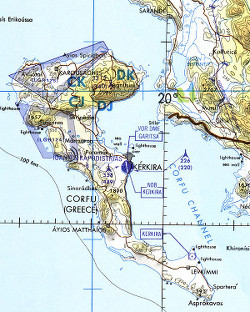
Another version clarifying the position of the
Corfu Channel.
The two shaded areas have not been identified.
SHIPS
PRESENT and IMAGES
(with
links to ship histories)
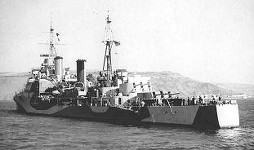
HMS Mauritius (Navy
Photos)
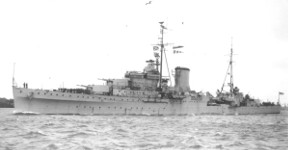
HMS Leander (Navy
Photos/Mark Teadham)
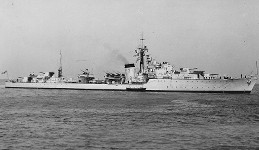
HMS
Saumarez
(Photo
Ships)
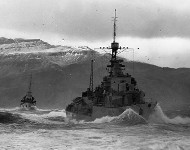
HMS
Saumarez (Photo
Ships)
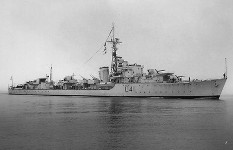
HMS Volage
(Photo Ships)
RESULTS
OF MINING
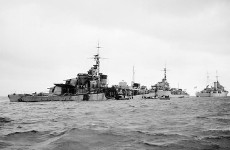
HMS
Saumarez ((c)
IWM A31207) - "showing the
damage sustained by an influence mine
laid in the Medri Channel area of the
Corfu Strait in the Mediterranean. The
mine was laid by Albania against
international agreements. She is seen
here under tow from HMS Volage, which
suffered a similar fate just two hours
later."
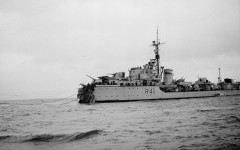
HMS
Volage ((c)
IWMA31208) - "showing the damage
(lost bow) sustained by an influence mine
laid in the Medri Channel area of the Corfu
Straight in the Mediterranean. She is seen
here towing HMS Saumarez (out of view to
right), which suffered a similar fate just
two hours previous."
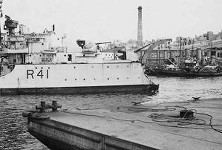
HMS Volage in Malta
(Navy Photos/Peter Crocker)
ROYAL NAVY CASUALTIES
with thanks to Don Kindell
Tuesday, 22
October 1946
Saumarez,
destroyer, mined in Corfu Channel off Albania
ATKINSON,
Bernard, Leading Radio Mechanic, C/MX 658647,
killed
BECKETT,
Lauriston B, Cook (S), D/MX 750559, killed
BRIFFA,
Victor E A, Act/Steward, E/LX 667166, killed
BUTCHER,
Donald G, Stoker 2c, C/KX 779246, killed
EDWARDS,
William A D, Writer, D/MX 738317, killed
EVA,
Stanley J, Leading Cook, D/MX 53041, DOW
FISHER, Robert, Able Seaman, D/JX
655048, killed
FORD,
William J N, Engine Room Artificer 5c, D/MX
93556, killed
FRANCIS,
Vernon, Able Seaman, D/JX 709105, killed
GALLAHAR,
Enoch J, Telegraphist, D/JX 724465, killed
GERMAN,
Raymond, Able Seaman, D/JX 708935, killed
GOODE,
Trevor W J, Stoker 1c, P/KX 763125, killed
HALL,
Francis R, Telegraphist, D/JX 711742, killed
HOLMES,
Norman, Able Seaman, D/JX 642544, killed
KITT,
William J H, Leading Stoker, D/KX 98204,
killed
LEWIS,
John, Able Seaman, P/JX 632719, killed
LLEWELYN,
Frederick E, Able Seaman, D/JX 769885, killed
LOCK,
Samuel F, Stores Petty Officer, P/MX 59959,
killed
MALLIA,
Francis X, Assistant Cook (O), E/LX 77952,
killed
MORRIS,
Ronald, Cook (S), D/MX 750902, killed
MUNN,
Reginald H, Petty Officer Writer, D/MX 58072,
killed
PARSONS,
Ernest W, Chief Petty Officer, D/JX 125562,
killed
PINE,
William H, Stoker Petty Officer, D/KX 90676,
killed
ROSS,
William P J, Able Seaman, D/JX 650092, killed
SCHOLES,
Frank M, Chief Petty Officer Telegraphist, D/J
112746, killed
SPEIGHT,
Gordon, Ordinary Telegraphist, P/JX 745538,
killed
STAERCK,
Walter J, Able Seaman, D/JX 709285, killed
WILSON,
Henry J R T, Leading Telegraphist, D/JX
245788, killed
WINTER,
Brian J, Leading Radio Mechanic, P/MX 742378,
killed
WINTERBOTTOM,
Sam, Able Seaman, D/XX 729949, killed
Volage,
destroyer, in company with Saumarez, mined in
Corfu Channel off Albania
BROOM,
Harry G, Leading Stoker, P/KX 92073, killed
CHANNELL,
Archibald J, Stoker Petty Officer, P/KX 88770,
killed
KEETON,
Cyril, Stoker Petty Officer, P/KX 78483, DOW
KNOTT, Joseph, Petty Officer, P/JX
161869, killed
LOCHLIN,
James L A, Stoker 2c, D/KX 786732, killed
MILLSON,
William E, Engine Room Artificer 3c, P/MX
55187, killed
PRICE,
Horace G, Act/Sub Lieutenant (E), RNVR, killed
TAYLOR,
Cyril J, Stoker 2c, P/KX 784766, killed
Wednesday, 23
October 1946
Saumarez,
mining
BEVAN,
Leslie O, Stoker 1c, D/KX 98551, DOW
DEBATTISTA, Antonio, Leading Steward,
E/LX 23209, DOW
HALES, Gordon H, Able Seaman, D/JX
652361, DOW
SAYERS, William H, Leading Stoker, D/SKX
86, DOW
Thursday, 24
October 1946
Saumarez,
mining
WEAVER, John, Leading Seaman, D/JX 150227, DOW
Monday, 4
November 1946
Saumarez,
mining
ZARB, Salvatore, Petty Officer Cook,
E/LX 20225, DOW
BRITISH
HONOURS and AWARDS
Recorded
in The London Gazette, issue
37937, 18th April 1947
CENTRAL CHANCERY OF THE ORDERS OF
KNIGHTHOOD.
St. James's Palace, S.W.1
22nd April, 1947.
The KING has been graciously pleased
to approve the award of the British
Empire Medal (Military Division) to
the undermentioned:
Petty Officer Maurice Frederick
RICHARDS D/JX.149722, H.M.S.
SAUMAREZ.
Stoker Petty Officer Charles
MITCHELL P/KX.75119, H.M.S, VOLAGE.
Able Seaman Arthur Reginald MUNTON
D/JX. 707942, H.M.S. SAUMAREZ.
for outstanding and gallant service in
damage control, fire fighting and
rescue work when H.M. Ships SAUMAREZ
and VOLAGE were mined in the Corfu
Channel on 22nd October, 1946,
ADMIRALTY,
Whitehall.
22nd April, 1947.
The KING has been graciously pleased
to approve the following Awards:
Commendation.
Commander Reginald Trevor PAUL,
C.B.E., Royal Navy, H.M.S. VOLAGE.
On 22nd October, 1946, H.M.S.SAUMAREZ
struck a mine in the North
channel,
Corfu. The explosion caused
grave
damage and started a major fire,
while the
disabled ship drifted towards shoal
water off
Sarande, Albania. H.M.S. VOLAGE
was
ordered to stand by, and was later
directed
to take her in tow. The tow was
passed
just in time to prevent the
SAUMAREZ
drifting ashore. Fifty minutes later
the VOLAGE also struck a mine, which
blew off her bows. The tow was
slipped, but the VOLAGE later
returned to the disabled SAUMAREZ,
took her in charge once
more,
and proceeded, both ships stern
first, to
Corfu Roads, arriving ten hours
later.
The whole operation took twelve
hours, the greater part being
carried out in darkness. It was due
to Commander Paul's seamanship and
skill that two of H.M. Ships, both
seriously damaged, were saved from
total loss.
Captain Williiam Halford SELBY,
D.S.C., Royal Navy, H.M.S. SAUMAREZ.
When on 22nd October, 1946, H.M.S.
SAUMAREZ struck a mine in the North
channel, Corfu, the explosion occurred
just forward of the bridge, causing
heavy casualties and starting a major
fire. The ship lost all power, and
drifted close to the Albanian shore.
After an interval, steam was raised
again, and Captain Selby was able to
turn his ship stern to wind, to begin
fire-fighting, and to secure a tow
provided by H.M.S. VOLAGE. Later,
H.M.S. VOLAGE was also mined, and
slipped the tow, but afterwards
another tow was passed, and the ships
proceeded stern first to Corfu Roads.
Still later an emergency lead was run
from the VOLAGE, and the fire was got
under control with the help of this,
and of parties from other ships. The
vessels arrived in Corfu Roads some
twelve hours after the first
explosion.
Although badly shaken and bruised,
Captain Selby, by his leadership,
example and cheerful devotion to duty,
encouraged his ship's company in their
efforts to save their vessel and to
extinguish the fire. Thereafter he
remained on duty for a further two
days, until ordered to report sick.
|
|
|
|
HANSARD
the report of proceedings of the House of
Commons (HC) and the House of Lords
available
under the Open Parliament Licence
1.
DESTROYERS, CORFU (MINE EXPLOSIONS)
HC Deb 23 October 1946 vol 427 cc1667-9 1667
Major Bruce
(by Private Notice) asked the
Parliamentary Secretary to the Admiralty whether
he has any statement to make on the mining of
two British Destroyers off the coast of Corfu on
22nd October.
Mr. Dugdale
Yes, Sir.
On the afternoon of 22nd October, the First
Cruiser Squadron, with accompanying destroyers,
was on passage through the straits between the
Island of Corfu and the mainland, close to the
Greek-Albanian boundary. The cruiser "Mauritius"
was leading, with the destroyer "Saumarez" close
astern; the cruiser "Leander" with the destroyer
"Volage" in company were two miles astern of the
"Mauritius."
At 14.53 hours an explosion occurred in the
"Saumarez," which was believed to have hit a
mine, and the ship caught fire forward. "Volage"
was then ordered to tow "Saumarez" back to
Corfu, but at 16.31 there was an explosion in
"Volage," whose bows were blown off.
"Volage" then attempted to proceed stern first
with "Saumarez" in tow, but with a westerly wind
there was considerable danger that both ships
might drift ashore. The Commander-in-Chief,
Mediterranean, ordered immediate assistance to
be sent from Malta and the Hospital Ship "Maine"
was also ordered from Zante to Corfu. The Greek
and Italian naval authorities were also asked
for assistance.
In spite of the difficulties, both of the
damaged destroyers succeeded in making their way
back and have now arrived safely at Corfu. A
board of inquiry is being assembled to inquire
into the cause of the explosion.
I regret to have to state that the casualties
suffered have been serious. The latest figures
received at the Admiralty are:
|
Killed
& missing, believed killed |
Injured |
| Officers |
1
|
2 |
| Ratings |
37 |
43 |
The next-of-kin are being informed. I am sure
the House will join with me in expressing the
deepest sympathy with the relatives of the
killed and injured men.
I should explain that at the time of the
accidents, both ships were in the very centre of
the swept channel, which is one mile wide. Their
position at the time was about 1 1/2 miles from
the Albanian coast. The channel was searched by
British minesweeping forces periodically from
October, 1944, to February, 1945, and no mines
were found. Since that time, the channel has
been in use by naval vessels of various sizes;
it has also been open to merchant ships for
nearly two years, though I cannot give
particulars of the amount of merchant traffic
that is using the channel.
(later
exchange)
Mr.
Churchill Is this the channel where
our cruisers were fired upon by the Albanian
batteries some months ago?
Mr. Dugdale Yes,
Sir.
(2)
MINED DESTROYERS CORFU
HC
Deb 20 November 1946 vol 430 c133W 133W
Commander
Noble asked the Parliamentary Secretary
to the Admiralty whether he will make a further
statement on the recent mining of two
destroyers; what further mine sweeping of the
channel between Corfu and the mainland has been
carried out since 22nd October; and with what
result.
Mr. Dugdale
Yes, Sir. The damage sustained by H.M.S.
"Saumarez" was very severe, and she may he a
total loss. The damage to H.M.S. "Volage" was
also severe, but it will be possible to repair
her. On 12th and 13th November, His Majesty's
minesweepers swept the North Corfu channel.
During this operation 22 mines were cut, two of
which were recovered and sent to Malta for
detailed examination. I regret that I cannot
make a further statement until the evidence
produced by this examination has been fully
considered.
(3)
ALBANIA (BRITISH NOTE)
HC Deb 11 December 1946 vol 431 cc1168-75 1168
Mr. Eden (by
Private Notice) asked the Secretary of
State for Foreign Affairs whether he has any
further information to give concerning the
questions raised in the Note delivered to the
Albanian Government.
Mr. McNeil As
Members will be aware, His Majesty's Government
delivered a Note concerning the incidents in the
Corfu Channel to the Albanian Government on 9th
December. In this Note, the text of which was
published today, His Majesty's Government
pointed out that they hold the Albanian
Government responsible for the mining of two of
His Majesty's ships in the Corfu Channel on 22nd
October, as a result of which 44 officers and
men of the Royal Navy lost their lives. In these
circumstances, His Majesty's Government are
demanding an apology and assurances that there
shall be no similar incidents in the future. His
Majesty's Government are also demanding full
compensation for the relatives of the officers
and men of the Royal Navy who lost their lives,
and reparation for the damage suffered by His
Majesty's ships.
His Majesty's Government also informed the
Albanian Government that, as this matter is of
such importance from the point of view both of
safety of life at sea and of the issues
involved, failing satisfaction, they will have
no alternative but to bring the matter before
the Security Council of the United Nations as a
serious threat to, and a breach of,
international peace and security, showing
criminal disregard of the safety of innocent
seamen of all nationalities lawfully using this
international highway.
His Majesty's Government hope that the Albanian
Government will recognise the most serious view
which His Majesty's Government take of these
deplorable happenings, and that they will,
therefore, return an early and a favourable
reply.
(later
exchange)
Mr. Rankin Was
any attempt made to inquire into or seek to find
out any reasons on the part of the Albanian
Government for these actions?
Mr. Churchill
For murdering our sailors?
(and later
still)
Mr. McNeil
Following is the text of the Note (to
the Albanian Government).
His Majesty's Government in the United Kingdom
have been reviewing the recent incidents in the
Corfu Channel ending with the serious incident
of 22nd October, in which two of His Majesty's
vessels were heavily damaged by mines with a
grievous loss of life.
2. The Albanian Government will be aware that
during the war of 1939–45 some hundreds of
thousands of mines were laid in the waters of
the Mediterranean and North-West Europe. They
will recall that in 1944 and 1945 the following
areas of Albanian territorial waters were swept
or searched by British minesweepers:
* Valona Bay—December, 1944.
* Durazzo Approaches—December. 1944: March,
1945.
* North Corfu Channel—October, 1944
No objection to this action was raised by
Albania or any other Power.
3. Only about 20,000 of the mines laid in the
waters of the Mediterranean and North-West
Europe had been swept by the end of hostilities.
In order to carry out the formidable task of
removing the remainder in a co-ordinated manner,
an international organisation was set up in
November, 1945, by agreement between the
Government of the U.S.S.R., United States,
United Kingdom and France. The objects of the
organisation were:
(1) To use the available minesweeping forces
to the best advantage for—
(a) the clearance of fishing grounds'.
(b) the widening of all channels;
(c) the establishment of clear water for
vessels, repairing important telegraph cable
routes;
(d) the clearance of areas containing mines
dangerous to surface shipping;
(e) the clearance of deep anti-submarine
mines.
(2) To promulgate information about mines and
mine clearance to the shipping of the world.
4. The International Central Mine Clearance
Board was composed of representatives of the
four powers mentioned above. On the
recommendation of the Central Board, other
Powers were invited to become members of Zone
Boards. Thus, the Mediterranean Zone Board
consists of representatives of France, Greece,
U.S.S.R., United Kingdom, United States and
Yugoslavia. Certain other Governments were
invited to send observers, but Albania was not
so invited because she possessed no
mine-sweeping forces.
5. As the Albanian Government are aware, the
second of the two objects mentioned in paragraph
2 above was fulfilled by the issue of MEDRI
charts and pamphlets by the International
Routeing and Reporting Authority. The areas of
Albanian territorial waters swept by the British
minesweepers were included in these
publications. Albania, together with all other
Mediterranean countries, whether represented on
the Mediterranean Zone Board or not, received
thirty copies of these documents and a like
number of all subsequent monthly issues.
6. It was thus publicly notified that the
international waterway of the North Corfu
Channel was once again open to navigation and it
an other swept channels, wholly or partly in
Albanian territorial waters, were used by
British and other ships in possession of these
documents. In fact, until May of the present
year, shipping of all kinds regularly used the
Channel without hindrance from either Greece or
Albania, the territorial powers concerned, in
accordance with the normal rule of international
law, which recognises that in peace and war
there is both for warships and merchant vessels
a right of innocent passage through straits
forming highways of international maritime
traffic.
7. On 15th May, however, His Majesty's cruisers
Orion and Superb while passing Southward through
the swept channel in pursuance of their normal
occupations were fired on by Albanian batteries
fortunately without damage.
8. His Majesty's Government at once protested
strongly to the Albanian Government against this
deliberate and outrageous breach of
international law and maritime custom. They
requested an immediate and public apology and an
assurance that the persons responsible would be
punished. The Albanian reply dated 21st May, was
completely unsatisfactory. It alleged that the
Commander of the coastal batteries had signalled
the ships to move further off shore, that they
were not flying their flags and that they
hoisted their flags when fire was opened. All of
these allegations proved on investigation to be
without foundation. The Albanian reply assumed
that foreign warships have no right to pass
through an international strait part of which is
included in territorial waters, and added that
the ships would not have been fired upon if they
had been recognised as British ships.
9. His Majesty's Government renewed their
protest on 31st May, pointing out that the
Albanian reply ignored the right of innocent
passage, recognised by International Law, to
which attention has been drawn in paragraph 6
above. Even if the Albanian Government
mistakenly supposed that they had the right to
prevent such passage, the procedure adopted for
asserting it was contrary to the practice
accepted by all civilised nations in cases where
there are reasons for requiring vessels
belonging to another power to halt. In this
instance no warning was given and fire was
opened with twelve live rounds not fired across
the bows of His Majesty's ships but aimed at the
ships themselves and falling astern of them. His
Majesty's Government repeated their request for
the punishment of the officer concerned, for an
apology from the Albanian Government, and for an
assurance that there would be no further
interference in the right of passage through the
Corfu Channel.
10. In their reply, dated 21st June, the
Albanian Government said that they had no
intention of interfering with navigation on the
open sea or in the Corfu Straits, provided
shipping did not enter Albanian waters without
permission or show aggressive intent. They
reasserted the allegations made in the previous
Albanian note and stated that it was not the
intention to attack or damage British ships.
11. On 2nd August, His Majesty's Government
informed the Albanian Government that they had
taken note of this reply, that they could
recognise no right on the part of a territorial
power to demand the fulfilment of conditions
before entry was permitted into a recognised
international channel, that they could not agree
to give prior notification of passage through
the Channel and that if in future British ships
were fired on in the Channel, fire would be
returned.
12. On 22nd October, while a detachment of His
Majesty's ships was proceeding through the North
Corfu Channel, which as stated in paragraph 2
above had been swept, in October, 1944, two
destroyer's, H.M.S. Saumarez and H.M.S. Volage,
struck mines which had been laid in the fairway.
The explosions caused serious damage to the two
ships and a heavy loss of life. On this occasion
the Albanian batteries did not open fire but a
vessel of the Albanian Navy appeared flying the
Albanian ensign and also a white flag.
13. On 27th October, His Majesty's Government
informed the Albanian Government that in view of
the serious accidents to His Majesty's Ships the
channel would shortly be swept. On 30th October
the Albanian Government protested to the
Secretary-General of the United Nations
Organisation against what they termed "the
violation of territorial waters" and
"provocative incursions" by British warships. It
was also alleged without any justification in
fact that British aircraft had flown over
Albanian territory. Meanwhile, His Majesty's
Government in reply to their intimation that
minesweeping would shortly take place, received
a note from the Albanian Government on the 1st
November, protesting against the entry of
British warships into Albanian territorial
waters on 22nd October and stating that there
was no objection to minesweeping provided
territorial waters were not entered either
inside or outside the Strait. Since the part of
the Channel concerned lies wholly in territorial
waters this statement could only be construed as
meaning that the Albanian Government refused to
agree that the Channel should be rendered safe
for navigation. The note also stated that the
Albanian Government could take no responsibility
for the consequences if the minesweeping took
place and would regard it as a violation of
their sovereignty.
14. The Albanian Government were thus attempting
to obstruct the clearance of this serious menace
to international navigation. His Majesty's
Government therefore replied on 10th November,
that the sweeping of the Corfu Channel would
take place on the 12th. They informed the
Albanian Government that the sweeping of the
Channel had been unanimously recommended by the
Central Mine Clearance Board on 1st November;
they defined the exact area to be swept; they
declared that none of His Majesty's Ships would
be stationed in Albanian territorial waters; and
they stated that the operation would be carried
out in the same way as the original sweeping in
1944 and 1945 to which the Albanian Government
had raised no objection.
15. On receipt of this reply and on the eve of
the sweeping operation, the Albanian Government
addressed a further note to His Majesty's
Government stating that while the Albanian
Government did not in principle object to the
Royal Navy undertaking the sweeping of the
Channel they proposed that a mixed commission
should be set up to determine the area involved.
The swept Channel had in fact existed for two
years and all the information published about it
was in possession of the Albanian Government.
Thus it can only be inferred that their motive
in putting forward this last-minute proposal was
to delay the operation of sweeping the mines
which, as subsequent investigations leave no
doubt, the Albanian Government well knew to have
been laid in the fairway.
16. The Albanian Government simultaneously
addressed a second complaint to the
Secretary-General of the United Nations,
protesting in strong terms against the action of
His Majesty's Government in presenting them with
a fait accompli. They denied knowledge of the
existence of the Central Mine Clearance Board in
spite of the fact that a request that Albania
should be represented on it had already been put
forward by the Yugoslav Government, doubtless
with the knowledge of the Albanian Government.
Finally they again declared that the extent of
the Channel could only be determined by a mixed
commission set up by the United Nations and
including Albania.
17. On 12th and 13th November the sweeping
operation was carried out. Twenty-two mines were
cut, two of which were taken to Malta for expert
examination. This has shown that the mines were
of German manufacture, that they were free from
marine growth and that they still had grease on
their mooring cables. These facts leave no doubt
whatever that the mines were laid only a very
short time before the date on which His
Majesty's Ships "Saumarez" and "Volage" suffered
damage and casualties. The condition of the
mines has been verified by an independent
observer who was present during the sweeping
operation. Fragments recovered from H.M.S.
"Volage" also confirm the origin of the mines
which exploded on 22nd October and bear out the
conclusions reached above.
18. Ever since the attack on H.M.S. "Orion" and
"Superb," the Albanian authorities have
maintained a close watch on all ships making use
of the North Corfu Channel. Thus in June of this
year merchant ships passing through the Channel
were fired on, and during the passage of His
Majesty's Ships on 22nd October, the coastal
batteries were seen to be manned. It is certain
that no mine-field could have been laid in the
Channel within a few hundred yards of the
Albanian batteries without the connivance or at
least the knowledge of the Albanian authorities.
19. His Majesty's Government must accordingly
conclude that the Albanian Government either
laid the mine-field in question or knew that it
had been laid. The Albanian Government has thus
committeed a flagrant breach of International
Law. Under Articles 3 and 4 of the 8th Hague
Convention of 1907 any Government laying mines
in war-time, and a fortiori in peace, is bound
to notify the danger zones to the Governments of
all countries. (This obligation in fact applies
even if the zones in question are not normally
used by shipping). Not only have the Albanian
Government never made any public notification of
this minefield but they have also made no
comment on the continued issue of the relevant
Medri charts and pamphlets. They thus endorsed a
clear statement by the recognised international
authority concerned to the shipping of the world
that the Channel was safe for navigation. As a
result two of His Majesty's ships have been
seriously damaged and forty-four innocent lives
have been lost. Moreover, this conduct on the
part of the Albanian Government menaced with
destruction shipping of any kind using a Channel
which is a normal and recognised route for
international navigation.
20. His Majesty's Government demand that an
apology be made to them in respect of the
unprovoked attacks upon the Royal Navy, which
took place on 15th May and 22nd October, and
that they receive assurance that there shall be
no repetition of this unlawful action. They
further demand that reparation be paid for the
damage suffered by His Majesty's ships on 22nd
October and that lull compensation be paid to
the relatives of the forty-four officers and
seamen of the Royal Navy who lost their lives in
consequence of action on the part of the
Albanian Government which was an undoubted
breach of International Law, constituted a
menace to international shipping, to the safety
of which the most callous indifference was
shown, and must, in view of their knowledge that
His Majesty's ships habitually used the Channel
and claimed the right to do so under
International Law be regarded as a deliberately
hostile act against His Majesty's Government.
21. As this matter is of such importance from
the point of view of safety of life at sea and
of the issues involved, His Majesty's Government
must ask for an immediate reply. If no
satisfactory reply is received within fourteen
days of the delivery of this note His Majesty's
Government will have no alternative but to bring
the matter before the Security Council of the
United Nations as a serious threat to, and a
breach of, international peace and security,
showing criminal disregard of the safety of
innocent seamen of any nationality lawfully
using an international highway.
|